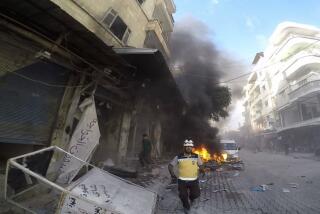Pair of car bombs explode in Syrian city of Homs
- Share via
BEIRUT -- A pair of car bombs exploded Wednesday in a busy residential district in the central Syrian city of Homs, killing at least 25 civilians and wounding more than 100, Syria’s official media reported.
The state news agency blamed the attacks on “terrorists,” the government’s standard description of rebels fighting to oust the government of President Bashar Assad.
A pro-opposition group, the Britain-based Syrian Observatory for Human Rights, also reported the two car bomb attacks.
Syrian state television aired scenes of charred vehicles, blood-spattered streets and black smoke pouring from damaged buildings as firefighters rushed to douse blazes.
There was no immediate claim of responsibility for the bombings, the first of which occurred when a parked car exploded on a busy street near a popular sweet shop, state media reported. The second bomb detonated nearby about half an hour later as people gathered near the site of the initial attack, according to government reports.
The vehicles exploded in the city’s Karm al-Louz district, home to many members of the minority Alawite sect, whose numbers include Assad and high-ranking commanders of the Syrian security services.
Alawite neighborhoods and towns in Homs, Damascus and elsewhere have been frequent targets of rebel attacks in the more than three-year Syrian conflict. Government forces have focused their bombardment on rebel-occupied districts that are usually home mostly to Sunni Muslims, the majority population in Syria.
Wednesday’s attacks came as rumors spread that the Syrian military may be planning an assault on Homs’ Old City, which has been largely under opposition control for more than two years.
There has been no official confirmation of an impending offensive against the Old City. Pro-government forces surround the district and the 1,000 or so residents said to be left suffer from lack of food, medical care and basic services. In February, more than 1,400 people, including many former rebel fighters, left the Old City under safe passage in a United Nations-backed evacuation plan.
Most residents long ago fled from the Old City. Homs, once home to about 2 million people, has been a major front in the war.
Many Homs neighborhoods, including much of the Old City and the adjoining Khalidiya district, have been largely reduced to rubble in a withering conflict that has cost more than 100,000 lives nationwide and sent millions of Syrians fleeing from their homes.
While the Syrian military has made steady gains, violence continues to wrack Homs and surrounding areas.
On Sunday, the Syrian Observatory for Human Rights reported that more than two dozen rebels were killed in the Old City when a vehicle that was being rigged as a car bomb detonated prematurely. Such bombs, sometimes driven by suicide attackers, have been potent weapons in the arsenal of the Syrian opposition.
A day later, an elderly Jesuit priest, Father Frans Van der Lugt. was assassinated by gunmen at his residence in the Old City. Each side blamed the other for the execution of the Dutch priest. He had lived in Syria for almost five decades and had declined to be evacuated, saying he preferred to remain and continue serving the people of his community, Christian and Muslim alike.
Elsewhere in Syria, pro-government forces backed by Hezbollah fighters from Lebanon on Wednesday overran the former rebel stronghold of Rankous, north of Damascus, the capital, according to various accounts.
The capture of Rankous is part of an ongoing government offensive to secure the Lebanese border area and cut off infiltration routes from Lebanon to rebel-held suburbs of Damascus.
Before the final assault, the pro-opposition observatory group reported, residents of Rankous demanded that Islamist rebels leave the town and reached a truce with the military in an apparent bid to spare the town further destruction and bloodshed.
Special correspondent Nabih Bulos in Amman, Jordan, contributed to this report.
More to Read
Sign up for Essential California
The most important California stories and recommendations in your inbox every morning.
You may occasionally receive promotional content from the Los Angeles Times.










